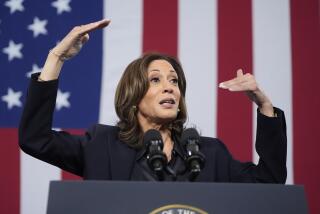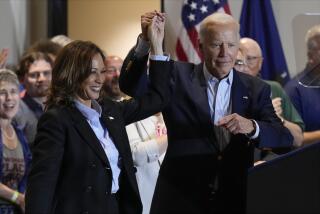Bush Hears Straight Talk From Steelworkers
- Share via
CANTON, Ohio — As President Bush’s campaign bus barreled down Interstate 77 toward this Rust Belt city on a recent Saturday morning, an unusual focus group with 10 local steelworkers convened inside the vehicle. Conducting the session was Bush himself.
Even in an election year, Bush’s direct encounters with the public have been infrequent, fleeting and almost always choreographed. In the free-flowing give-and-take aboard his private bus, however, the president got a polite but candid earful about the uneasy feeling many such workers have about the economy.
In the process, Bush had a rare opportunity to get his own fix on an issue that was not going his way in some politically critical areas, including Ohio. And the bus session, as well as the campaign stop immediately after it, reflected Bush’s continuing search for ways to deliver a positive economic message without seeming out of touch with ordinary voters.
“There was a lot of anxiety” over the economy, said participant Vince Martino, describing the meeting later. “The president said he could feel the tension there and understood.”
At one point, as Bush was talking about his efforts to make health insurance more widely available, a steelworker named Tom Miller, who described himself as a loyal supporter, all but interrupted the president to say, “Insurance is important, but it doesn’t mean a lot if you don’t have a job.”
At the next campaign stop, Bush made a point of expressing empathy with the region, telling 5,000 raucous supporters: “I just traveled on the bus with workers who told me they are nervous about their future. They’re concerned. I am too.”
This week, Bush continued to deal with the subject in ways calculated to show that he understood such workers’ pain. He virtually banished the phrase “turning a corner” from his public remarks on the economic outlook -- a line he had begun using not long before.
On Wednesday, addressing voters in Chippewa Falls, Wis., Bush praised the economic energy of farmers, workers and small-business owners, saying “well-timed tax cuts” had helped lift the economy. But he prefaced his remarks by acknowledging problems. “There’s more to be done to keep this economy growing. We’ve been through a lot,” he said.
“We’ve done our job. We’ve created the conditions for economic growth, but there is more work to do,” he said later in words that reflected the fine line he hoped to walk: talking up the economy without seeming insensitive to those having trouble.
The Ohio workers he met with -- employed by Timken Co., an old-line manufacturer of ball bearings and other steel products -- live under the threat of plant closings. Details of their free-flowing session of July 31 were provided by seven of the 10 participants in interviews, and generally confirmed by aides from the White House and the president’s campaign.
The group included Democrats and Republicans, white-collar workers and union members.
The participants all cited Bush’s personal charm, and his ability to put them at ease and encourage candor.
There wasn’t room for everyone to sit, for example, so a few had to stand. Bush offered his recliner to Betsy Burns, a products inspector. Taken aback, she demurred.
“This is an executive order. Sit down!” the president barked. Amid much laughter, Burns saluted and settled into the president’s cushy chair while he remained standing throughout the session.
“That really broke the ice,” said Jeff Clark, director of advanced product technology.
Timken has been in the news in this campaign because Bush visited one of its facilities here in 2003 and said his tax cuts would create jobs. But this year, the company announced plans to close three Canton-area ball-bearing plants that employed 1,300 workers.
Sen. John F. Kerry, the Democratic presidential nominee, has pointed to Timken’s problems as symptomatic of what he says are Bush’s flawed economic policies.
Employment concerns were definitely on the minds of the workers Bush met with, and they said he shared their anxieties.
“The job security issue was the single item that was bad, from his perspective,” said Susan Palomba, Timken’s manager of healthcare benefits.
“Every time someone else chimed in [about job worries], others nodded their heads in agreement,” added Sharon Jordan, a quality analyst at one of the targeted ball-bearing plants.
In response to the participants’ economic concerns, Palomba, Jordan and others said, Bush talked up the benefits of his tax cuts, as well as potential economic gains from his pending initiatives, such as a national energy plan.
When Jordan, a mother of three, fretted about the cost of college, Bush responded, “Sometimes we have to do things we don’t like to do,” referring to taking out loans. He also brought up the role of community colleges as “one of the best things going,” Jordan said.
Miller told the president that he would not be getting many votes from steelworkers. Miller, a Bush supporter, drove home his point by describing the grief he caught from co-workers when he wore a “Steelworkers for Bush” T-shirt to the plant.
“You’re a brave soul,” Bush replied, touching off a round of laughter.
At the end of the meeting, Bush turned to his reelection prospects. Although he expressed his belief that he would win on Nov. 2, Bush said he would be at peace with himself “if people elect to send me home.”
“He said he wanted to be remembered as being effective and he was not worried about trying to be popular,” said Chancelor Wyatt, a marketing manager at Timken.
John Grogg, a furnace operator who put on the dress blues of his Pennsylvania Air National Guard unit for the occasion, quoted the president as saying: “You know, if I should lose this reelection for president of the United States, I know that I’ve done as good a job as I can do. And God would say, ‘Good servant, take a break.’ ”
The give-and-take on the bus stood in sharp contrast to standard Bush campaign events, where staffers and volunteers carefully screened attendants -- and recently evicted a woman and her family members from a Michigan rally because one wore an abortion rights T-shirt.
At one point during the Ohio session, Bush lauded the sacrifices of U.S. troops in Afghanistan and Iraq. “There were tears in just about everybody’s eyes,” recalled Martino.
At another point, Bush turned to Grogg, the Air National Guardsman, and asked, “Sergeant, have you been to Iraq yet?”
“Not yet, sir,” Grogg replied.
“Do you want to go?” Bush asked.
“In a heartbeat,” the reservist said.
“God bless you, son,” the president told him.
“I’m only four years younger,” Grogg said later. “But I kind of liked that, him calling me ‘son.’ ”
As they parted company, the men exchanged salutes.
The idea for the meeting came from the Bush campaign, and Timken’s senior human resources officials assembled the group -- a cross-section of the company, a spokesman said. Neither the campaign nor the company issued the seven men and three women any do’s or don’ts, according to Martino and Jason Saragian, a Timken spokesman.
Bush is likely to continue meeting with voters, advisors said. Indeed, he held a similar session, lasting about 40 minutes, with 19 employees of Boeing Commercial Airplanes during a visit to the Seattle area late last week.
The tenor of that meeting was more upbeat, perhaps because Boeing -- rebounding from a slump in aircraft sales -- recently announced plans to hire 3,000 more workers by year’s end.
More to Read
Get the L.A. Times Politics newsletter
Deeply reported insights into legislation, politics and policy from Sacramento, Washington and beyond. In your inbox twice per week.
You may occasionally receive promotional content from the Los Angeles Times.










